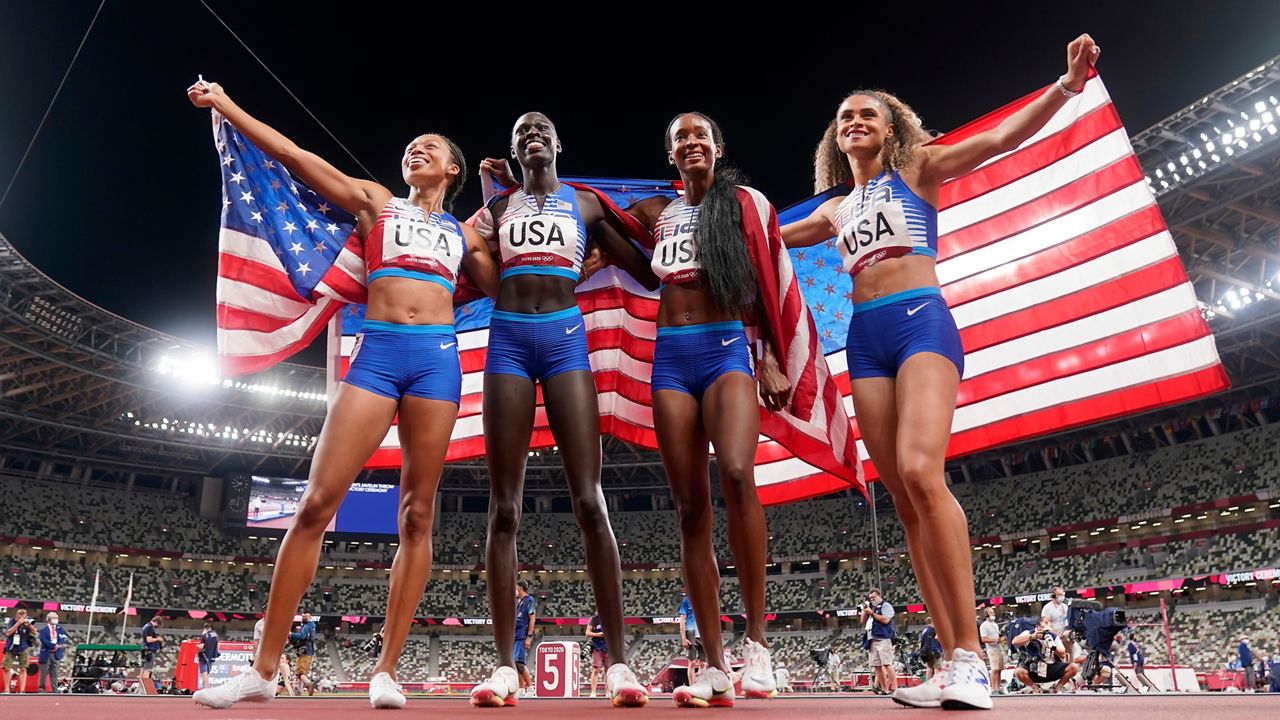History has been made. The new medal standard in Olympic women’s track has been set, and Allyson Felix stands alone at the top.
Felix won her 11th career Olympic medal Saturday, combining with her American teammates to finish the 4x400-meter relay in 3 minutes, 16.85 seconds for a runaway victory.
The team of Felix, Sydney McLaughlin, Dalilah Muhammad and Athing Mu was never in jeopardy in this one. It was America’s seventh straight victory at the Olympics in the 4x400. Poland finished second, 3.68 seconds behind, and Jamaica finished third.
The 35-year-old American runner finished third in the 400 meters Friday to win her 10th career medal and become the most-decorated woman in the history of Olympic track. She won her record medal with a push down the home stretch of the 400 meters to bring home the bronze.
Felix has more Olympic track and field medals than any woman in history, and more than any U.S. athlete, in a career that dates back to 2004 in Athens.
Felix passed Carl Lewis with the most track medals of any U.S. athlete. Of the 11 medals, seven are gold.
Paavo Nurmi of Finland holds the all-time mark in track with 12 medals from 1920-28.
The recent victories for Felix came nearly three years after she helped spearhead a conversation about the way women are treated in track, and sports in general. She severed ties with Nike, which wrote in pay reductions to women’s contracts if they became pregnant. Felix had a daughter in 2018.
She won the race wearing a shoe she designed for a company she created.
While third place might have been a letdown in the past for Felix — famous are the snapshots of her crying in the recesses of the stadium after some hard-luck losses in Athens and Beijing — this one was nothing but sweet.
Felix has spoken candidly about the struggle to come back from a difficult pregnancy that led to an emergency C-section and put the lives of both her and her baby in jeopardy.
She’s spoken of the pressure she felt to return quickly, even when her body wasn’t responding the way it once did.
She also overcame one of her biggest hurdles — leaving her well-cultivated private image behind to become a spokesperson for something much bigger.
This week, she gave voice to the topic that’s been filtering through the Tokyo Olympics — the pressure to win.
“When I line up for a race, I’m normally afraid,” she said in a heartfelt essay on social media, posted only hours before the race. “I’m not afraid of losing. I lose much more than I win. That’s life and I think that’s how it’s supposed to be.”
The relay win came on McLaughlin’s 22nd birthday, and gave her another gold to go with the one she captured when she set a world record of 51.46 in the 400-meter hurdles earlier in the week.
The race featured four U.S. medalists -- McLaughlin, Felix, Muhammad, who finished second in the hurdles, and Mu, the 19-year-old who won gold in the 800.
It wasn’t so much the win that was in doubt but the world record of 3:15.17, set at the 1988 Seoul Games in the last relay the Soviet Union ran as an Olympic team.
By the time Mu collected the baton from Muhammad for the anchor lap, the clock read 2:28 and the record was out of reach. But the win was in the bag.
The four sprinters huddled and hugged. Felix is 35, and has detailed her long struggle simply to make the Tokyo Olympics. Mu turned 19 this summer, and there’s a chance she’ll need a mighty big medals case when it’s all over.
Minutes after the women won, the U.S. men also romped to the gold. The first win for the American men’s sprinters came on the last event run on the Olympic oval and gave the U.S. a total of 26 — seven of them gold — with only the men’s marathon remaining Sunday.
Other winners Saturday included Neeraj Chopra in the javelin, who won India’s first-ever gold medal in Olympic track and field.
Another first went to Mariya Lasitskene, who’s victory in the high jump gave the Russian team its first gold of the meet. The Russians were only allowed to send 10 track and field athletes to Tokyo.
Jakob Ingebrigtsen brought 1,500-meter gold to Norway, while Sifan Hassan, who runs for the Netherlands, added the 10,000-meter gold to the gold she won in the 5,000 and bronze she won in the 1,500. She’s the first to try that triple at the Olympics.
The Associated Press contributed to this report.
